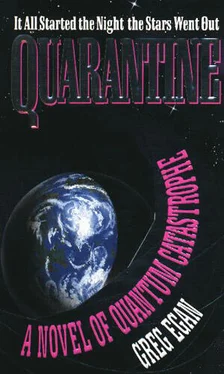I'm astonished that he even knows my name. 'Fine.'
'That's good. I hear you were … recruited specially.'
I don't reply. If discussing BDI is out of bounds, I'm hardly free to start chatting about the loyalty mod and the circumstances which led to its imposition.
It doesn't take long to reach the sixth floor. Just before the doors open, he says quietly, 'So was I.'
He steps out ahead of me, and passes through the security check without looking back. As I follow him down the corridor — a few steps behind, in silence — I feel, absurdly, like some kind of conspirator.
'Up. Up. Up. Up. Up. Up. Up. Up. Up. Up. Down. Down. Up. Up. Up. Down. Up. Down. Down. Up.'
Ten in a row is rare enough to notice, but it still means nothing. Toss a coin ten times, and the odds are less than one in a thousand that you'll get ten heads — but toss it nine hundred times, and the odds are better than one in three of at least one run of ten or more. Toss it nine thousand times, and the odds are almost ninety-nine in a hundred.
I glance at the histograms. Some are clearly distorted in the aftermath of the run, but already I can see them beginning to drift back towards their usual shapes.
I've long given up any pretence of trying to ignore the data. Fighting it only makes it more seductive — and in the unlikely event of an intruder getting past all the other layers of security and bursting into Room 619, I doubt that my reaction time would be significantly impaired just because I've let myself notice the latest illusory pattern in Chung Po-kwai's chant. It feels like a kind of heresy to make this excuse; the priming mods are all about being in the optimal state of preparedness, nothing less. But given the apparent bug in P3,'optimal' means something different now; I have no choice but to accept that. Lee and I have both dutifully informed Tong of the problem, but nothing will come of that; neither Axon — makers of P3and Sentinel — nor ASR (who clearly have plenty of neural mod expertise of their own) are likely to waste their time and money investigating such an obscure flaw.
'Up. Up. Up. Up. Up. Up. Up. Up. Up. Up. Up. Up. Up. Up. Up. Up. Down. Up. Up. Down.'
Sixteen! A new record. I plug numbers into the tiny program I've written for von Neumann. I've been present at forty-one fifteen-minute sessions, or thirty-six thousand nine hundred events… in which there's a twenty-five per cent chance of a run of sixteen. But I have no time to ponder this —
'Up. Up. Up. Up. Up. Up. Up. Up. Up. Up. Up. Up. Up. Up. Up. Up. Up. Up. Up. Up. Up. Up. Up. Up. Up. Up. Up. Up. Up. Up..'
My concentration falters, and I lose count. I turn to the histograms again. All the familiar ragged shapes have vanished, replaced by narrow spikes, growing steadily narrower.
'Up. Up. Up. Up. Up. Up. Up. Up. Up. Up. Up. Up. Up. Up. Up. Up. Up. Up. Up. Up..'
Dr Leung laughs and says, 'P has hit ten to the minus fourteenth. I believe we have an effect.' Dr Lui looks away from the screen, visibly overcome by emotion. Dr Tse glances at him, and scowls.
The strange thing is, there's no hint in Po-kwai's voice that she's noticed her triumph. She just keeps calling the data as patiently as always — and the sound of her voice, even without the hook of randomness, is just as hypnotic as ever.
Three minutes later, the run ends, decaying into the usual noise for the rest of the session. When Po-kwai emerges, sans dark glasses, she stands in the doorway for a moment, shielding her eyes with her forearm, then she squints about the room, looking dazed.
And then, dejected.
Dr Tse says, 'Congratulations.'
She nods and whispers hoarsely, 'Thanks.' She hugs herself and shudders, then her mood suddenly brightens. She turns to me. 'I've done it, haven't I?'
I nod.
'Well, don't just stand there. Where's the champagne?'
The ad hoc celebration only lasts about an hour; four people (and one zombie onlooker) don't make much of a party. I know there are twelve other scientists and nine other volunteers working on the project — they're listed in MetaDossier — but apparently Dr Leung isn't eager to share the news of her success with these rival teams.
The scientists talk shop, discussing plans to pump their subject's head full of positron-emitting tracers to confirm certain aspects of 'the effect' — but nothing they say gives me any clues as to how 'the effect' arises. Po-kwai sits by, looking tired but happy, occasionally joining in the conversation and out-jargoning them all.
In the elevator, she says, 'Well, at least now I know that I'm if.'
'Sorry?'
'Not the control. Didn't you know? In the mornings, another volunteer has been doing exactly the same thing — counting ions from the same Stern-Gerlach machine. It was a double-blind experiment; one of us had a placebo mod, one of us had the genuine article … and only the computers knew who had what — until now. Poor woman. If I'd gone through all of that for nothing, I'm sure I'd be furious.' She laughs. 'Maybe that's what tipped the balance; maybe that's why I'm not the control.' I give her a puzzled look; she smiles in a way that makes it clear that she's joking, but the point of the joke escapes me.
We alight on the thirtieth floor; Po-kwai says she's too tired to eat. As always, I search the apartment methodically. She sighs. 'Tell me: even assuming that some rival of ASR found out about the project — and managed to get access to the files showing which volunteers had the genuine mod — do you honestly believe they'd go to all the trouble of trying to kidnap one of us?'
BDI went to all the trouble of kidnapping Laura — for the sake of the very same talent that Po-kwai now possesses. But talk of BDI is forbidden, and Po-kwai knows nothing about Laura; from comments she's made, it's clear that she assumes — or was told — that the mod was designed on a computer, from scratch.
I shrug. 'I'm sure they'd much rather get their hands on the mod's specifications, but — '
'Exactly! That would take a thousand times less work than grabbing someone and scanning them — '
'— but you can be sure that the specifications aren't exactly unprotected, so it would be crazy to make the alternative more tempting. I don't think you should be worried — but I don't think any of the security here is wasted. It's hard to say how far a competitor might go. I have no idea what the commercial value of this thing might be in the long term … but just imagine how much you could make in a casino in just one night.'
She laughs. 'Do you know how many atoms there are in a pair of dice? You're asking me to scale up today's result by roughly twenty-three orders of magnitude.'
'What about electronic devices? Poker machines?'
She shakes her head, amused. 'Not in a million years.'
What about picking locks? Maybe that's out of the question, maybe it took Laura thirty years to learn how to perform feats like that. This prototype mod is unlikely to include anything but the primary skill, leaving out all of Laura's experience in applying it … but Po-kwai still deserves to know the truth about the talent she's received — and surely the more she knows, the more she's likely to achieve. How can it be in the Ensemble's best interests to keep her in the dark about the mod's origins, and potential? Maybe I have no right to question that decision … but I can't pretend that it makes sense to me.
She slumps down on the couch, and stretches, then glares at me reproachfully. 'We've just made the scientific breakthrough of the century, and you're talking about poker machines?'
'I'm sorry; gambling is the first thing that came to mind. I can't say I've given much thought to the nobler applications of telekinesis.'
Читать дальше










